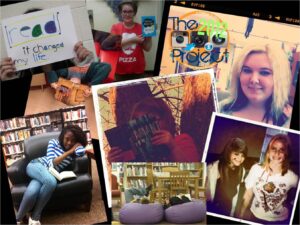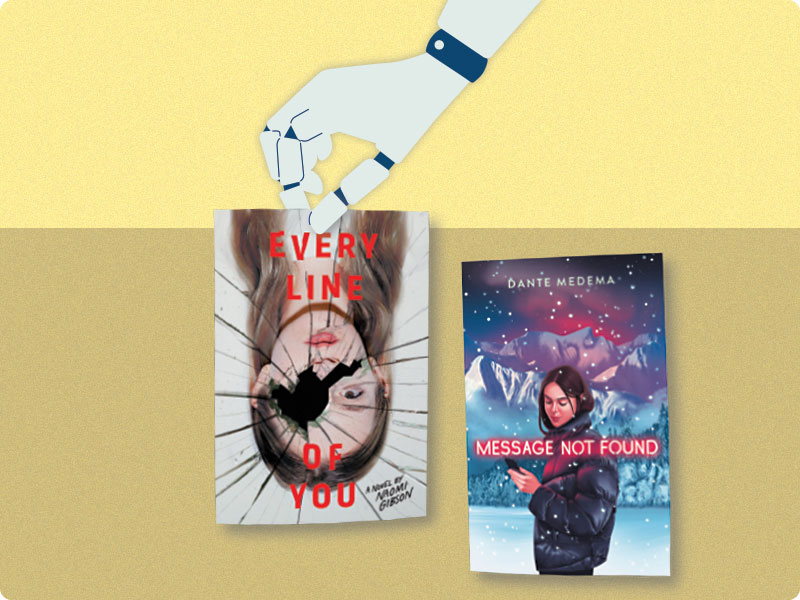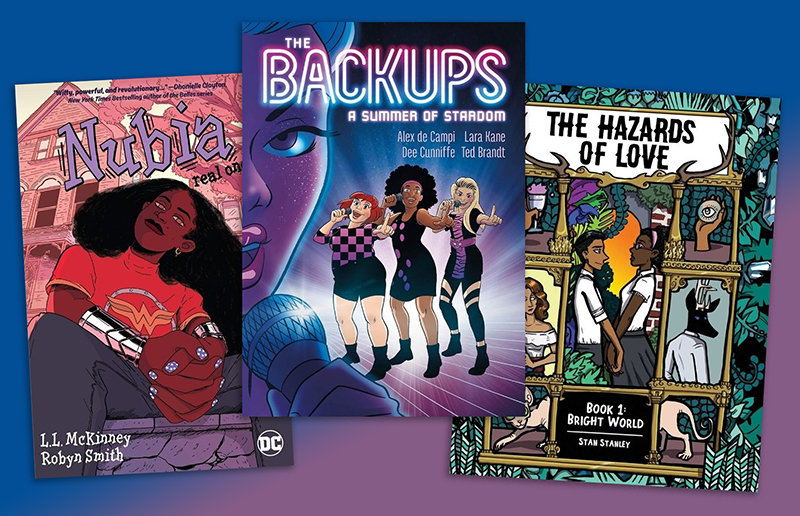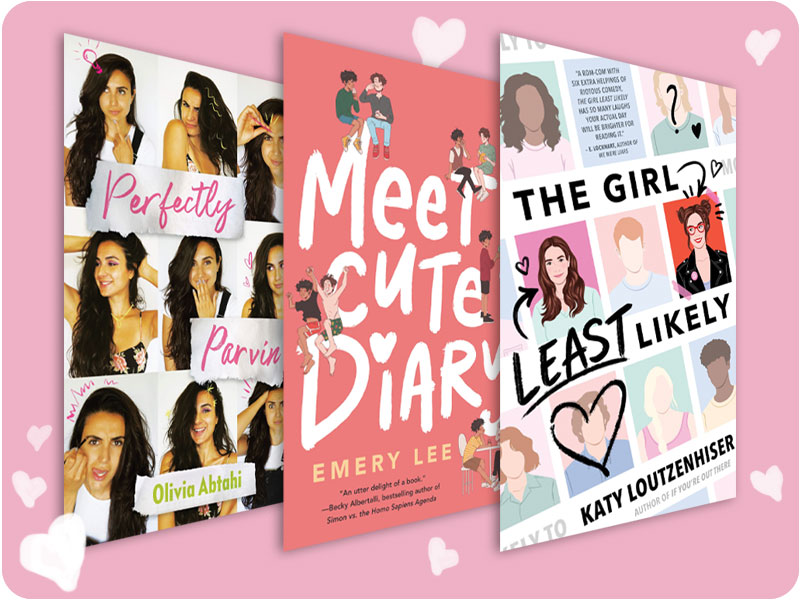Dispelling Some Myths about Public Libraries, One Tweet at a Time
 I have worked in public libraries for 24 years now and every few months (weeks? days?) it seems like another think piece or post on social media comes out proclaiming that we should just shut down and stop funding our public libraries because no one even uses them anymore, or everyone just uses the Internet, or that nobody reads, or that you can just buy your books from Amazon. That happened again this week but this time, the outcome was different.
I have worked in public libraries for 24 years now and every few months (weeks? days?) it seems like another think piece or post on social media comes out proclaiming that we should just shut down and stop funding our public libraries because no one even uses them anymore, or everyone just uses the Internet, or that nobody reads, or that you can just buy your books from Amazon. That happened again this week but this time, the outcome was different.
Earlier this week Andre Walker posted that no one, especially adults, uses public libraries anymore and that we should just take all the books and put them in the schools.
ADVERTISEMENT
ADVERTISEMENT
I know this makes Librarians angry but shutting libraries and putting the books into schools would be an absolute good. https://t.co/AEy4X0iAAx
— Andre Walker (@andrejpwalker) October 24, 2017
To be clear, Walker is a New York Observer columnist who lives in the UK, so he is probably talking about UK libraries, which I am no expert on. However, this type of sentiment is very common and librarians and library users responded to his tweet. To begin, let’s break his tweet down. This tweet makes a lot of incorrect assumptions:
1. That nobody – especially adults – uses public libraries anymore.
The truth is, public library use is up, especially among millennials.
Public library use in U.S. highest among Millennials | Pew Research
Library usage and engagement by Americans | Pew Research Center
2. That a public library is nothing more than a building full of books.
As I mention, I have been a public librarian for 24 years and even before the turn of the century, public libraries were more than just a building full of books. Yet with the growth of technology and a public that is increasingly reliant on online access, public libraries have become increasingly important as an information portal to their local communities. That’s to say nothing of the programming, services, and resources that public library provides to help meet the educational, developmental, recreational, and informational needs of citizens of all ages in their local communities.
But at the same time that public library usage goes up and local communities grow increasingly dependent on their libraries to meet a wide variety of their needs, our culture, which seems to be growing steadily away from the idea of the collective good, continues to decrease or even suggest un-funding public libraries. This puts our most vulnerable populations at risk as they are the most dependent on the library for computer usage to search for and apply for jobs, as well as the technology training that many local libraries provide, supplemental materials for school work, and even just safe places to be social and engaged. But it is not just our most vulnerable that libraries serve in our collections, programs and services, but the entire public. For example, The Public Library of Mount Vernon and Knox County (where I work), hosts a Great Decisions series where we invite the public to come and discuss current and relevant topics with informed speakers and reading materials. This week alone we will host a 10-hour family Halloween movie marathon, story times, safe Trick or Treating, and our Teen MakerSpace will be open for teens to come in and safely explore topics like coding, robotics, electronics and crafting in a safe environment with access to a great variety of tools and resources that they may not have at home.
And yes, we have books. A lot of them and in a variety of formats on a variety of topics to meet a variety of needs and interests. Books to help you fix your car, apply for college or jobs, learn a new skill, decorate your home, etc. etc. etc. Oh, and to read for fun. Because reading for fun is valuable too: 10 Benefits of Reading: Why You Should Read Every Day.
To highlight what public libraries are doing, I asked my fellow librarians on Twitter to share with us the various ways that their local public libraries were helping their communities using the hashtag #PubLibsProvide. Libraries are doing amazing things, from lending mobile hotspots and bikes to creating seed sharing libraries. This is in addition to the daily task of providing quality reference assistance, computer access, technology training, and, of course, access to a wide variety of books, materials and resources.
3. That school and public libraries are interchangeable.
I think it’s also important to point out here that school and public libraries each have very different functions and service focus, both equally important, and that communities need both. Research shows us time and time again that students who attend schools with strong libraries are more successful: Strong School Libraries Build Strong Students. Their goals are, rightly, focused on the students first and foremost. Research also reinforces the knowledge that communities with strong arts programs, including public libraries, thrive and are more attractive to both business and new residents: How Arts and Cultural Strategies Create, Reinforce, and Enhance Sense of Place; Why Public Libraries Matter: And How They Can Do More – Forbes; Making Cities Stronger – Urban Institute. The hours, types and breadth of the collections, and types of programs and services at a school library aren’t meant to serve the entire community in the same way that a public library is and does. So while moving the books from a public to a school library may be beneficial to the students in the schools that receives those books, it would not benefit the entire community in the same way that the local public library is and does.
The outcome to this story is, however, slightly different then the outcome of most of these stories. You see, the response to Mr. Walker was so loud and with such a positive outpouring of support for public libraries that he changed his mind:
Dear #Library users, I surrender! pic.twitter.com/1F0cog6xo0
— Andre Walker (@andrejpwalker) October 24, 2017
Thank you to everyone that Tweeted. Even I learned of some innovative new ideas that I want to go and talk with my admin about.
Filed under: Advocacy
About Karen Jensen, MLS
Karen Jensen has been a Teen Services Librarian for almost 30 years. She created TLT in 2011 and is the co-editor of The Whole Library Handbook: Teen Services with Heather Booth (ALA Editions, 2014).
ADVERTISEMENT
ADVERTISEMENT
SLJ Blog Network
2024 Books from Pura Belpré Winners
In Memorium: The Great Étienne Delessert Passes Away
Winnie-The-Pooh | Review
Parsing Religion in Public Schools
ADVERTISEMENT








I’ve been following his tweet and the replies all week, and it’s been a joy to read the responses. If nothing else, at least he stirred up a public discussion about the usefulness of libraries, so that is positive.
I loved seeing all of the replies. You’re right, it started out as a frustrating negative but it turned into something positive.
Thank you.
Very interesting article. Thank you for providing input into this original tweet.
I originally worked in the public library for seven years while in college and loved every minute, but I felt the pull of the school library and working directly with students and teachers. I am so glad that our local public library works with us to provide storytellers, programs for early childhood, etc. that we could never afford to do on our own. We are a small rural school and the public library is 30 miles away so many of our kids do not have a way to attend programs at the physical library location.
My family loves, loves, loves to hang out at the public library so I am in full support of the public library. I also see many people in the community helped out by the many services they offer including computer classes, used book sales, storytimes, etc.
I am so glad that many people spoke up to let the original tweet by Andre so he decided to change with opinion.
Thanks for making this issue explode! Unfortunately, I think you are right that our country seems to be moving away from doing things for the public good. Librarians usually seem to go against the flow, so I guess it’s up to us to keep beating the drum: Public libraries benefit their whole community, whether everyone uses them or not. Those who use them are better informed and better equipped than they would otherwise be, and that benefits the community. School libraries benefit student development, which makes students better prepared to become contributing members of society.